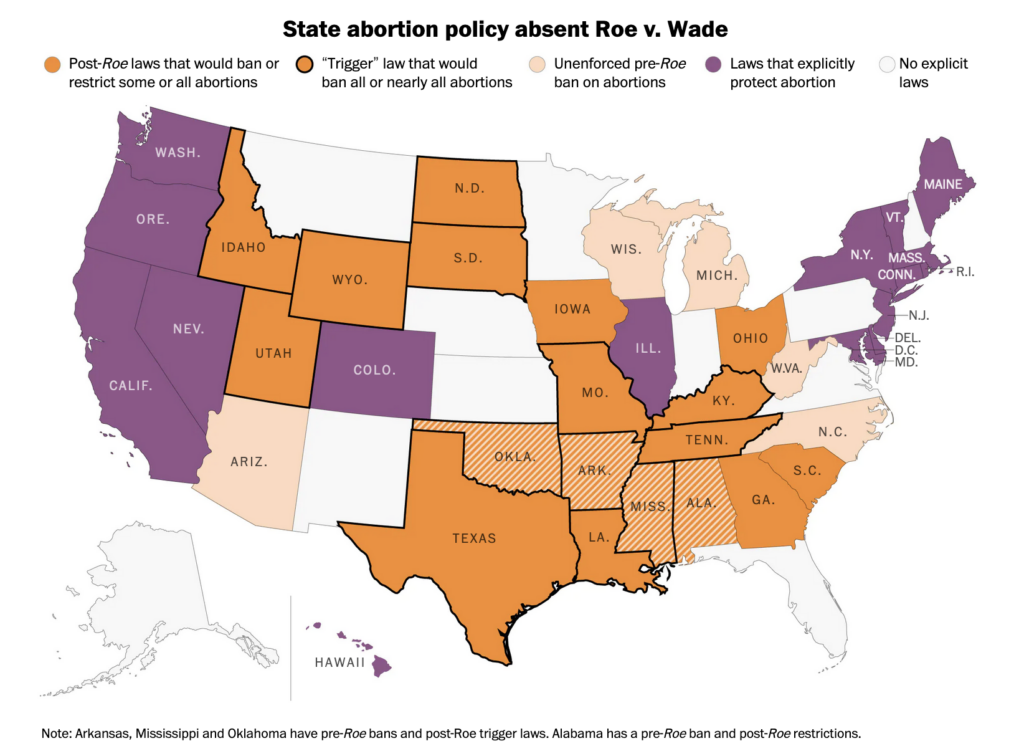Introduction
After Roe v. Wade, pro-life groups and states organized efforts to counteract the ruling in favor of abortion rights. Trigger laws were one of these political mechanisms used to mobilize anti-abortion agendas. These laws were written and passed by state governments to ban abortion in the event that Roe v. Wade were overturned [5]. They are constitutional in the respect that they have no implications and are not enforced unless their conditions are met [5]. Trigger laws were written and passed into the state constitutions of 13 states: Arkansas, Idaho, Kentucky, Louisiana, Mississippi, Missouri, North Dakota, Oklahoma, South Dakota, Tennessee, Texas, Utah, and Wyoming.

Southern Correlation
The prevalence of trigger laws in the South is apparent, with 8 of 13 states located in the South. Correlations to religion, political affiliation, and patriarchal prevalence in Southern culture can be used to explain this. Such laws can be said to represent the memory of Southern prosperity. They represent the societal norms of the time and can reflect the ever-lasting image of “the good old days.” Holding on to the past is a way of memorializing Southern history and consecrating the hegemonic narrative. Preserving these old ways of life, however, prevents the processual aspect of memory from utilizing the lessons of the past to grow.
Oklahoma
Oklahoma was one of the first states to pass a trigger law that entirely banned abortion in May of 2022 [1]. The law, H.B. 4327, states “any person…may bring civil action against any person who performs or induces an abortion, knowing engages in conduct that aids the performance of an abortion, or intends to engage in an abortion” [2]. Such prohibitions on abortion are applicable immediately after conception [6]. Punishments for engaging in any of these acts include incurring “injunctive relief sufficient to prevent the defendant from violating this act, statutory damages in an amount of no less than $10,000, nominal and compensatory damages, and court costs and attorney fees” [2].
Such laws that promote the civilian persecution of individuals seeking abortions are colloquially termed “bounty hunter” laws and pose serious implications to society. Actively seeking out others can possibly encroach on personal rights to privacy and speech.
After the Dobbs decision, this total abortion ban went into effect after a final certification by an attorney general [7]. In March of 2023, the Oklahoma Supreme Court amended this law to allow abortion only when the pregnancy is “necessary to preserve her life” [3]. This law speaks of preservation in terms of physical health only and does not consider the possible emotional harm/trauma that could threaten the life of the person who’s bearing an unwanted pregnancy.
Mississippi
Mississippi passed its trigger law, S.B. 2391, in 2007. This law states” No abortion shall be performed or induced in the State of Mississippi, except in the case where necessary for the preservation of the mother’s life or where the pregnancy was caused by rape” [4]. This law is applicable immediately after conception. Punishments are stated to include, “imprisonment in the custody of the Department of Correction for not less than one year nor more than ten years” [4].
In the event of a legal abortion, the law interestingly notes that the physician must go through a set of precautionary steps. The physician is obligated to “perform fetal ultrasound imaging and auscultation of fetal heart tone service, offer to provide the patient with the opportunity to view the active ultrasound image…and heartbeat if audible, offer to provide the patient with a physical picture of the ultrasound image, obtain the patient’s signature, and retain a copy of the signed certification form” [4]. Although some of these steps follow necessary medical procedures, some attempt to emotionally sway the patient into keeping the fetus. By asking the patient to listen to the heartbeat and keep a picture of the ultrasound, it evokes emotions of shame and regret during the process. This law is especially interesting when considering the initial conditions of this abortion. In Mississippi, these patients will be either in life-threatening conditions or rape victims. Guilt-tripping a person with a uterus for being a victim poses salient questions to the morality of these laws. In addition, this law makes a point to mention the picture must be “of a quality consistent with standard medical practice” and “shall accurately portray the presence of external members and internal organs” [4].
Conclusion
Trigger laws represent the continuous effort to deny reproductive rights but also the fierce loyalty to a false narrative of the South. The South continues to mold memory into something that preserves its core values. These core values were of the prosperous South and its strong familial ties, founded in Christianity. Preservation of gender imbalances is ingrained into the laws and political machines of these states. Without access to abortion, the true effects of the Dobbs decision and the enacting of these laws are unknown. However, it can be predicted that with the recent acquisition of agency, those with a uterus will continue to be outspoken and challenge the hegemony of the South.
Aaliyah Horton
Works Cited
[1] “Oklahoma Becomes the First State to Entirely Ban Abortion.” Center for Reproductive Rights (May 25, 2022)
[2] “Oklahoma House Bill 4237 (Prior Session Legislation).” LegiScan (2022)
[3] “Oklahoma Supreme Court Rules the Right to Abortion is Protected in Life-Threatening Situations.” Center for Reproductive Rights (March 21, 2023)
[4] “Senate Bill 2391” Mississippi Legislature (2007)
[5] Johnson, Sarah. “Abortion & Trigger Laws.” Bill Track 50 (May 17, 2022)
[6] Kitchener, Caroline. Schaul, Kevin. Kirkpatrick, N. Santamariña, Daniela. Tierney, Lauren. “States where abortion is legal, banned or under threat.” The Washington Post (April 14, 2023)
[7] Nash, Elizabeth. Guarnieri, Isabel. “13 States Have Abortion Trigger Bans- Here’s What Happens When Roe is Overturned.” Guttmacher Institute (June, 2022)
[8] Santamariña, Daniela. Phillips, Amber. “What would happen if Roe v. Wade were overturned.” The Washington Post (September 2, 2021)